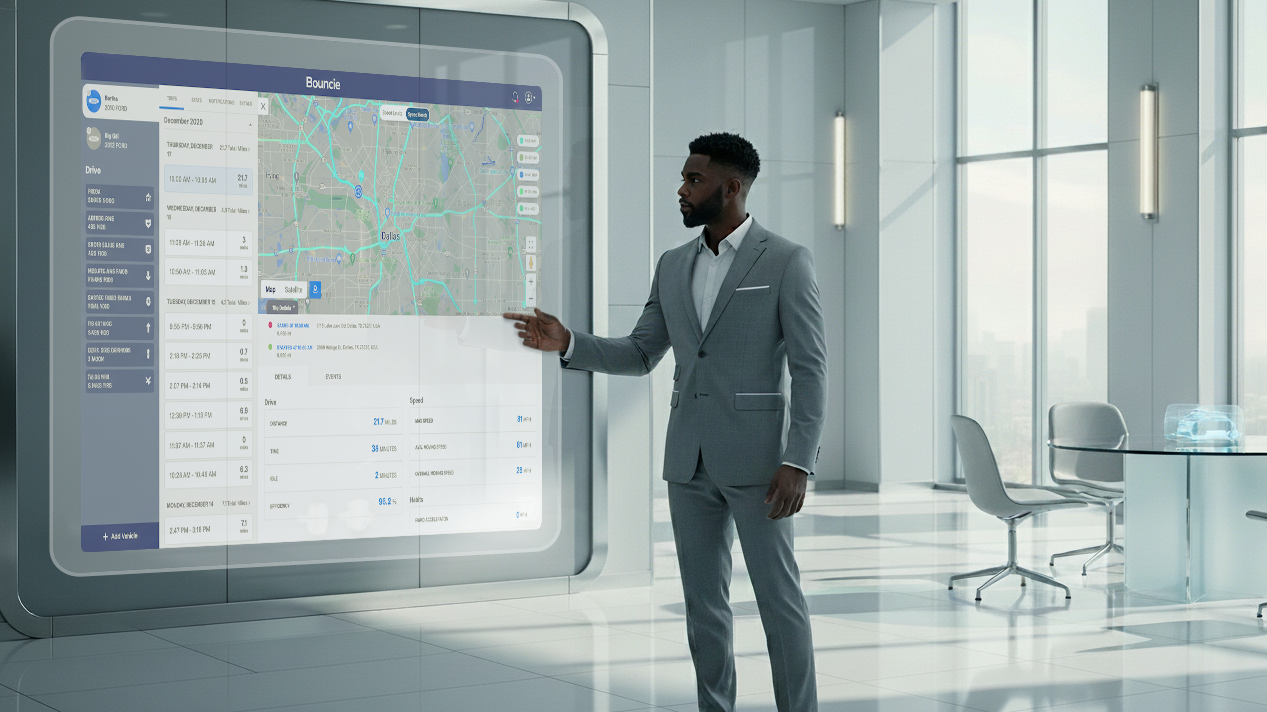Why GPS Trackers Are Becoming a Standard in Insurance Tech

The importance of data is readily apparent in our daily lives. In a business context, data analytics systems predict upcoming market trends and help pinpoint customer preferences. In our personal lives, algorithms deliver highly personalized social media posts, video content, and news feeds tailored to our interests. It should be no surprise that even long-standing industries have been transformed by this data revolution. The insurance industry is an excellent example. Today’s leading insurance companies utilize a wide range of data-driven tools, including AI and data analytics, to gain a more nuanced and real-time understanding of risk.
At the heart of the insurance tech revolution is a familiar yet highly versatile device: the GPS tracker. Once a simple tool for navigation, Modern GPS trackers for insurance provide invaluable data about driver behaviors, vehicle health, usage patterns, and more. Fleet managers, car-sharing hosts, vehicle rental companies, and dealerships with loaner cars have discovered that GPS trackers with the right set of features are the key to unlocking more favorable insurance outcomes.
Here’s why GPS trackers are becoming a standard in insurance tech and how they provide the data that leads to cost savings.
The Rise of Telematics in Insurance
To fully understand how GPS trackers for insurance purposes came to play such a prominent role, it’s best to start with the rise of telematics in the industry. The term telematics refers to technology that sends, receives, and stores data about remote objects, such as vehicles, via telecommunications devices. Early telematics devices could track specific, individual vehicle data for insurance uses, including speed, trip duration, and engine diagnostics.
Today, advanced GPS trackers can not only track location but also tap into a wealth of insurance telematics data. Some Gps trackers plug into a vehicle’s OBD-II port, granting it access to the onboard computer systems. Insurers can now gain unprecedented, real-time insight into a vehicle’s usage. To understand why this is so important, consider the two main functions of the insurance industry, underwriting and claims.
Updating Underwriting
Traditionally, underwriting, the process of assessing risk and determining premiums, heavily relied on historical data. Underwriters used factors like a driver's age, credit score, zip code, and accident history to predict future risk. GPS-driven insurance telematics radically updates this model by providing dynamic, real-time data. Insurers can now see not just who is driving, but how they are driving. This includes information on speed, acceleration, braking, and mileage. Now, underwriters can work with sophisticated risk models to develop personalized insurance rates.
Transparent Claims
In the event of an accident, telematics data becomes critical to the claims process because it provides insight into what actually happened. For example, GPS data can confirm the time and location of the incident, while accelerometer readings can help calculate the force of impact. Now the claims process is more transparent, ensuring both the insurer and the insured are protected.
It’s easy to see why the insurance industry is moving away from making assumptions based on demographic and historical averages. GPS-powered telematics provides the foundation for more equitable and accurate processes.
Why GPS Trackers Are a Game-Changer for Insurers
Underwriting and claims may represent the foundation of insurance, but GPS trackers hold the potential to revolutionize every aspect of the industry. For example, real-time data on driving behavior completely changes risk assessment practices. Using GPS for risk assessment, insurers can analyze actual driving habits, including metrics like hard braking, rapid acceleration, excessive speeding, and mileage.
A fleet that consistently operates within safe parameters can be classified as a lower risk, potentially leading to more favorable premium rates. This data allows insurers to build highly sophisticated risk models, segmenting customers based on actual on-the-road behavior rather than broad assumptions. But, which GPS tracker meets that criteria?
Meet Bouncie. As the worlds of vehicle management and insurance increasingly overlap, Bouncie provides the accessible, real-time data that enables them to streamline operations and better manage their risk profile.
Aiding Theft Recovery and Accident Reports
GPS trackers also help combat the problems that cost insurance companies significant money, such as theft and accidents. For businesses with multiple vehicles, such as car-sharing hosts or dealerships with loaner cars, the risk of theft is always present. A GPS tracker provides the exact location of a stolen vehicle, dramatically increasing the chances of a swift recovery.
This is how GPS technology not only prevents the total loss of a valuable asset but also mitigates the associated costs and complexities of a theft claim. In the event of an accident, location data provides indisputable evidence of where and when the incident occurred,
Accountability Makes for Safer Driving
Another benefit for insurers is more of a psychological phenomenon, but it’s a benefit nonetheless. The mere presence of a monitoring system like a GPS tracker encourages safer driving through accountability. When drivers are aware that their behavior is being monitored, they are more likely to adhere to speed limits, avoid aggressive maneuvers, and operate their vehicles with greater care. This behavioral shift, often referred to as the "observer effect," directly translates to a lower likelihood of accidents.
For insurers, a fleet equipped with GPS trackers shows their commitment to safety. They’ll see that business as a more attractive and less risky client. With this proactive approach to loss prevention, businesses benefit from a safer, more efficient fleet, and insurers save money by processing fewer claims.
Car Sharing and Usage-Based Models Are Fueling Adoption
Car-shaing has been at the forefront of adopting GPS trackers for their telematics capabilities. Platforms like Turo and Getaround enable individuals and businesses to monetize their vehicles through rental-like agreements. Meanwhile, ridesharing apps like Uber and Lyft operate on usage-based models, and they have also helped fuel the adoption of GPS-based telematics.
Why is that? Primarily, this is because traditional, static insurance models are not particularly effective in these scenarios.
Car-sharing hosts are exposed to considerable risks, including unauthorized use, theft, and potential disputes over mileage or damage. Ride-hailing or ridesharing drivers can’t predict how they will use their vehicles. The risk profile of a vehicle changes from one trip to the next, depending on the driver and the vehicle's intended use.
This is why insurance providers for these usage-based models are increasingly requiring telematics as a prerequisite for coverage. In these new models, insurers need the objective, real-time data that a GPS tracker provides to accurately assess risk, validate claims, and protect their interests. And that's where telematics tools like Bouncie shine.
By equipping a vehicle with Bouncie, a host, driver, or fleet manager can provide their insurance partner with the transparent data they require: verifiable trip histories, speed and driving behavior analysis, and instant impact detection in the event of an accident. This data stream not only reduces risk for the insurer but also empowers the vehicle owner to be a better partner in their own protection. The result is a more collaborative and data-driven insurance relationship.
Recommended by Leading Insurers
For evidence of the value of GPS trackers as insurance tech, you only have to look at the large number of insurers who recommend these devices. Bouncie is proud to be a trusted and recommended partner for leading insurance providers like Tint, Roamly, ABI, and INSHUR. Each of these insurance partners recognizes the power of real-time data in creating smarter, more responsive insurance products. Here are a few examples of this partnership in action:
- Claims management and FNOL: When an incident occurs, Bouncie's impact detection and location data provide an immediate and accurate First Notice of Loss (FNOL).
- Fraud reduction: By verifying the vehicle's location, time of use, and impact data, insurers can quickly identify discrepancies, making GPS data a powerful deterrent to fraudulent claims.
- Faster settlements: With verifiable data from the outset, the entire claims lifecycle is accelerated. Investigations are streamlined, liability is determined more efficiently, and settlements can be processed more quickly.
Benefits for Insurance Tech Platforms
Insurance tech platforms know the value of highly accurate, real-time data. For them, the widespread adoption of GPS trackers is welcome for a number of reasons:
- More accurate and dynamic risk scoring: Instead of relying on traditional metrics like a driver’s age and zip code, insurance tech companies consume live telematics data to understand risk on a granular level.
- Improved claim verifications with the use of trip history records and vehicle status information taken directly from onboard systems.
- Better customer experiences, thanks to the improved transparency and faster issue resolution.
Car Sharing + Bouncie = Smarter Insurance
With Bouncie’s real-time data, car-sharing platforms can provide hosts and drivers a modern insurance experience. For example, Turo hosts use Bouncie to protect their assets and streamline operations.
Imagine a Turo guest reports damage or that they were involved in an accident. Without objective data, the claims process can become bogged down in a back-and-forth dialogue as adjusters attempt to determine what happened. With Bouncie, the host has an indisputable digital record. They can provide their insurance company with timestamped location data, trip histories, and impact detection alerts that verify exactly when and where an incident occurred.
Or consider how dealerships with a fleet of loaner cars might struggle to quantify their risks, ultimately paying high premiums. Bouncie-enabled vehicle monitoring programs are a powerful alternative. By tracking metrics such as speeding, hard braking, and rapid acceleration across all vehicles, fleet managers have access to accurate data and can present insurers with a clear picture of the actual risk.
Future-Proofing Insurance Products With GPS
Today’s GPS telematics devices, such as Bouncie, are just the beginning of a data-driven revolution in the insurance industry. As technology evolves, you can expect to see a more intelligent and data-rich ecosystem become the norm in insurance tech, with GPS serving as the essential data layer. For insurers, the time to future-proof is now by joining the telematics revolution.
A Look Into the Future of Insurance
To get a glimpse of the future, think of how AI thrives on data. The continuous stream of information from a GPS tracker, encompassing everything from route density and time of day to driving behavior, will enable AI models to predict risk with remarkable accuracy.
Evolving insurance tech will help further automate the claims process. Imagine a scenario where a Bouncie device detects a crash. That single data point could automatically initiate the FNOL, dispatch roadside assistance to the precise location, and even pre-populate a claim file with all the relevant time, location, and impact force data.
Drivers will also benefit from the merging of data and insurance products. Insurers will be able to offer policies uniquely tailored to the specific use case of a vehicle or fleet. This could mean a policy for a car-sharing host that automatically adjusts rates based on rental frequency, or a commercial fleet policy that offers discounts for avoiding high-congestion zones during peak hours.
Platform Flexibility: Bouncie’s Integration Capabilities
Regardless of how insurance technology evolves, Bouncie will continue to provide the essential data layer. Bouncie offers an open API for custom integrations with insurance platforms. The no-code workflow automation tool Zapier supports hundreds of use cases, including the Bouncie for maximum integration opportunities. It’s this type of flexibility that makes Bouncie a scalable solution for insurers and fleet tech ecosystems alike.
Bouncie: The Standard in Insurance Tech
The insurance industry has long been centered on data. Actuarial tables, risk assessments, and premium calculations have always been based on collected data and metrics. But today, real-time data is changing the game. GPS trackers now provide a continuous stream of information that enables the development of more accurate and valuable insurance products.
However, not all GPS devices offer the same benefits. The Bouncie OBD-II tracker is ideal for insurance tech, as its combination of GPS and telematics data empowers safer, more innovative, and more efficient coverage. To begin future-proofing insurance products for car-sharing, ride-sharing, fleets, and more, visit the Bouncie website today.



